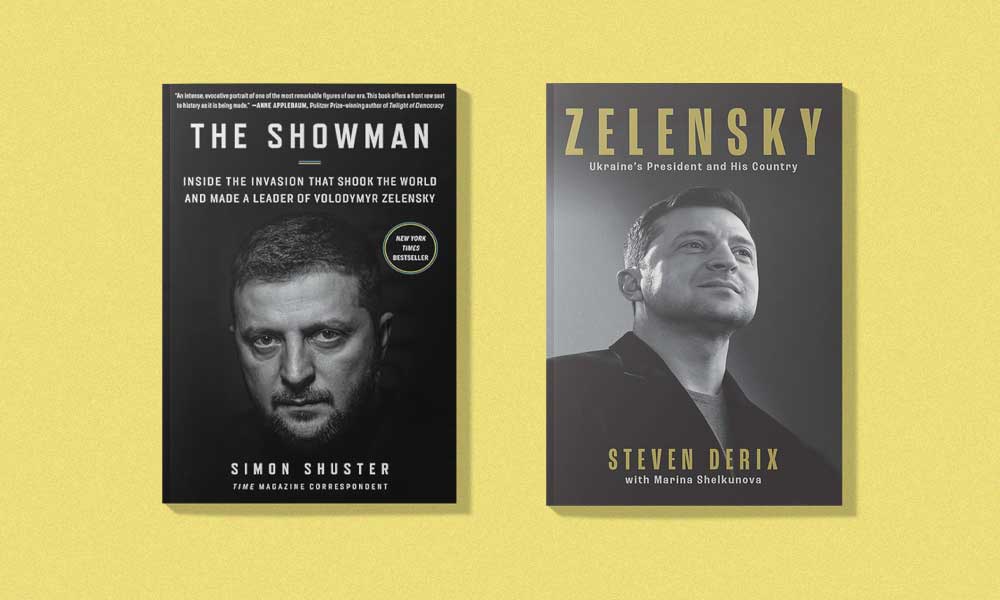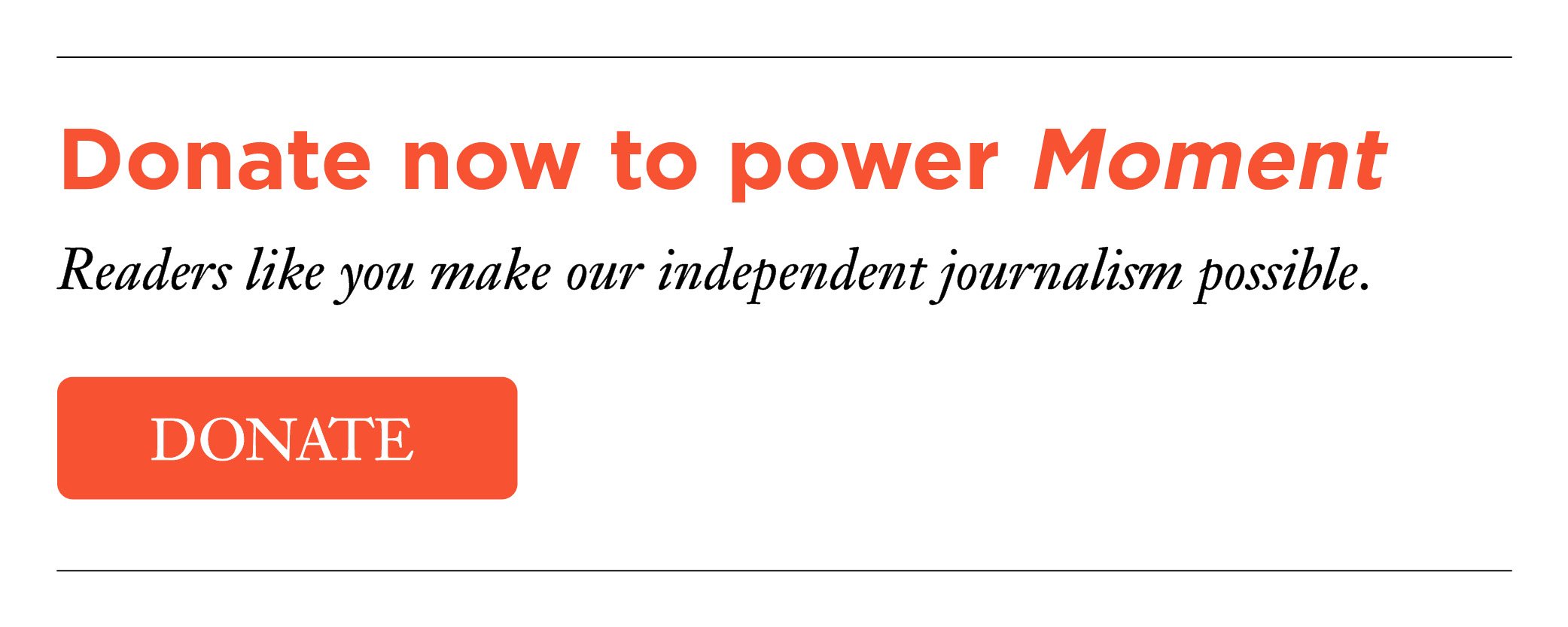
The Showman: Inside the Invasion that Shook the World and Made a Leader of Volodymyr Zelensky
By Simon Shuster
William Morrow, 384 pp.
Zelensky: Ukraine’s President and His Country
By Steven Derix with
Marina Shelkunova
Canbury Press, 256 pp.
The rise of Volodymyr Zelensky from comic improv-artist-turned-movie-star, to wealthy producer, to wartime leader of a besieged Ukraine is improbable enough to invite hyperbole. A Ukrainian savior. A Ukrainian Churchill. The Lincoln of our times. As it happens, the true story, shorn of messianic comparisons, is still worthy of admiration but reminds us that political leadership is a process of growth and that even inspiring leaders will disappoint from time to time.
As is evident from these two biographies—Simon Shuster’s published this year, Steven Derix and Marina Shelkunova’s in 2022—Zelensky is not, in fact, an angelic astronaut who landed on Planet Ukraine, a profoundly corrupt fragment of the shattered Soviet Union. He is a complex figure who converted his popularity as an entertainer into political capital and became president of a turbulent kleptocracy whose orientation toward Russia or Europe was being disputed by oligarchs, separatists, nationalists, protesters and crooks.
Zelensky was born into the puzzle that is Ukrainian nationality: a Jew by birth from the country’s East, whose household’s mother tongue was Russian. He became rich as a Russian-speaking comedian, movie actor and media executive thanks to the big market for Russian-language entertainment next door in Russia.
During the revolutions in the streets of Kyiv in 2005 and 2014, his improvisational comedy troupe remained defiantly, satirically neutral. When he chose to run for president in 2019, then-Time correspondent Shuster reports, he enlisted the support of the owner of the Russian TV channel that carried his programs so that he might have an oligarch and a partisan news channel on his side, just like the opponents whom he regarded as irretrievably corrupt. He may have been new to politics, but he was not new to Ukraine.
Zelensky’s successful campaign drew critically on his skills as a performer, not a political thinker. He avoided taking tough positions on crucial questions by dismissing such stuff as politics as usual. He issued no platform. But as Derix—a Dutch television reporter who has covered Russian and Ukrainian media—describes it, Zelensky’s pre-election debate with incumbent candidate Petro Poroshenko was a masterpiece of literally performative politics.
During the revolution of 2014, known as the Maidan Revolution or the Revolution of Dignity, when police and security forces bloodied protesters and killed some of them, Zelensky, then a private citizen, had gone on Ukrainian television’s biggest TV news show to speak seriously. The country’s relations with Russia and the Russian language were the hot-button issues.
His pre-election debate with Poroshenko was a masterpiece of literally performative politics.
To militant opponents of the use of Russian he appealed, as Derix recounts: “…in Crimea, if people want to speak Russian, lay off of them…Give them the legal right to speak in Russian…I have Jewish blood, I speak in Russian, and I’m a citizen of Ukraine. I love this country, and I don’t want to be part of another country.”
As for Russia’s seizure of Crimea, Zelensky spoke of Russians and Ukrainians as “brotherly nations” and implored Russian President Putin to relent: “If you need it, I can beg you on my knees…But please, don’t put our people on their knees.”
Derix writes that in the campaign debate between Zelensky and Poroshenko, the incumbent, who had led the fight against Russian separatists in the East, invoked Zelensky’s line about begging on his knees to accuse him of groveling before Putin. Zelensky said his words had been taken out of context and promised to kneel then and there for all Ukrainians who had lost a family member at the front. He then did precisely that and forced Poroshenko to physically follow his lead. Zelensky won by a landslide.

Volodymyr Zelensky with UK Prime Minister Boris Johnson in Kyiv, Ukraine in 2022. Photo credit: Number 10 (CC BY-NC-ND 2.0)
If the notion of a TV star running for president, sans platform but capable of bringing the house down, sounds familiar, it evidently did to Zelensky as well. Shuster, without denying Zelensky’s extraordinary talent, traces a character flaw in the man through many of the challenges he faced: He believed in his ability to charm his way out of every jam, as he had been accustomed to doing as an entertainer and media executive. Zelensky thought he could charm Putin into a fair peace agreement. He expected Donald Trump to be a kindred spirit and ended up embarrassed when the first Trump impeachment inquiry turned up his seemingly obsequious response to Trump’s search for dirt on Joe Biden and the company Burisma. “The next prosecutor will be 100 percent my person, my candidate,” he was heard to say on the recording of his “perfect” phone call with Trump. “He or she will look into the situation, specifically the company that you mentioned…” He later sacked the corrupt prosecutor in question; at a different point, his health minister remarked that COVID-19 was “killing all the pensioners” and was also sacked. Even before Russia’s invasion, Zelensky governed with a heavy reliance on executive decree, raising the question of whether, should he ever have the chance to serve in peacetime, he will prove more deferential to democratic institutions.
Confident of his own judgment that Russia would not attempt an assault on the capital, Kyiv, he ignored American intelligence warnings until the invasion was undeniably imminent. Even then, he refused to publicly acknowledge reality so as to avoid panic. Shuster raises the question of what might have been avoided had the country been given an extra day’s notice of the attack.
Only after he witnessed the toll of Russian atrocities against Ukrainian civilians and saw the impact those devastated sites had on visiting European politicians did Zelensky find his role as a wartime leader. He was Ukraine’s eloquent and fearless advocate, making his country’s case to Europeans and Americans who doubted Ukraine’s chances of repelling the Russian army and whose fear of a war with Russia drove them to excess caution. He appealed to their sense of honor, their shame, their geopolitical interests. He never fled Ukraine, preferring to live for months in an underground bunker rather than leave his embattled people. Flaws and all, his presidency has been heroic.
And what do we make of this Ukrainian president, hailed as the Churchillian savior of his country, being a Jew or at least, to use his own measure, having “Jewish blood” from both parents?
Soviet Jews suffered systemic discrimination bolstered by a double whammy: “Jewish” was considered a nationality rather than a religion in the Soviet Union (in mixed marriages national identity was passed down by the father) but Jews did not have a republic of their own to administer. Those who maintained a religious identity typically emigrated when they could; those who remained were mostly members of a Sovietized secular version of Jewish ethnicity. The failure of communism damaged these Jews’ sense of pride in Soviet achievements; the breakup of the USSR turned them from citizens of a superpower into minorities in newly independent smaller countries, which were sometimes flexing long-atrophied nationalist muscles. The Jews typically spoke Russian, which was often decried by locals as the language of imperial colonizers.
Out of this historical process of deracination there emerged people like Zelensky, somehow both quintessentially Jewish (are we surprised that a Jew was the country’s top comedian?) and utterly non-Jewish (he had no background of religious observance, his father opposed his going on a trip to Israel, and at least one of his children was christened, though for unspecified reasons his parents did not attend). He once told a journalist that it was touring with his comedy group for troops at the front, appreciating the valor and the patriotism of his audience, that made a true Ukrainian of him. From these two books about his careers in entertainment and politics, his Jewishness seldom seems to have figured against him in either of those spheres.
Zelensky and Ukraine remind me of the observation I once heard from a historian: In the clichéd discourse of popular journalism, national identity is depicted as something ancient, its customs and rivalries carved in stone from time immemorial. Mention Jews and Ukraine and we think of Bohdan Khmelnytsky, the 17th-century Ukrainian national hero whose Cossack followers committed some of the most atrocious anti-Jewish pogroms Europe had ever seen. But the academic discourse assumes the very opposite: How we think of ourselves is something fluid and ever-evolving. Ukraine’s choice of a president, to the bafflement of Vladimir Putin, signals that Ukrainians have developed a new national identity, forged in protest, combat and sacrifice, in which a Jew is a welcome member and a leader—and even, plausibly, a savior.
Robert Siegel is Moment’s special literary contributor.
Moment Magazine participates in the Amazon Associates program and earns money from qualifying purchases.


